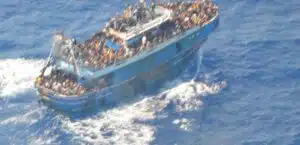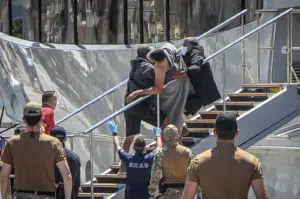Brussels – After a seven-month investigation into the Pylos tragedy, the verdict is in. “The current rules leave the EU’s Border and Coast Guard Agency unable fully to fulfill its fundamental rights obligations and too reliant on Member States to act when boats carrying migrants are in distress,” the European Ombudsman Emily O’Reilly wrote in the conclusions released today (Feb. 28) of the investigation launched in late July 2023 to shed light on Frontex’s role in the events that caused the drowning deaths of more than 600 people off Pylos (south of the Peloponnese) in Greece between June 13 and 14, 2023.

“We must ask ourselves why a boat so obviously in need of help never received that help despite an EU agency, two member states’ authorities, civil society, and private ships knowing of its existence,” the European Ombudsman said, who notes how – according to documents inspected – Frontex made “four separate offers” to assist Greek authorities by providing aerial surveillance of the Adriana, “but received no response.” Based on current regulations in force, Frontex was not permitted to go to Adriana’s location at critical periods without permission from the Greek authorities. In mid-June, some 750 people departed from Tobruk in Libya, bound for Italy. The boat had capsized in the Sar zone under the jurisdiction of Greek authorities, which conducted no relief efforts despite warnings from the Italian Coast Guard, Frontex, and several NGOs. 
Since it was impossible to operate without permission from Athens, Frontex assets flew over the shipwreck site off the coast of Pylos only twice. The first was at 9:47 a.m. on June 13 with an aircraft two hours after Italian authorities issued the alert – reporting that there was no imminent threat to the vessel. The second was at 4:05 a.m. on June 14, with a drone after the shipwreck had already occurred. Among the questions raised by O’Reilly are “Why did reports of overcrowding, an apparent lack of life vests, children on board, and possible fatalities fail to trigger timely rescue efforts that could have saved hundreds of lives.” This cannot but involve the “obvious tension” between Frontex’s fundamental rights obligations and its duty to support member states in border management control.
“Cooperating with national authorities when there are concerns about them fulfilling their search and rescue obligations risks making the EU complicit in actions that violate fundamental rights and cost lives,” warns the Union’s inter-institutional body, which asks EU institutions, bodies, and agencies to account for practices, not in line with their mandates. It could also explain the non-transparent attitude of the European Commission in hesitating to remind member states of their sea search and rescue duties. Although Frontex includes the term ‘coast guard’ in its name, its current mandate and mission “clearly fall short” of this goal: “If Frontex has a duty to help save lives at sea, but the tools for it are lacking, then this is clearly a matter for EU legislators.”

(credits: Eurokinissi / Afp)
For example, the European Ombudsman investigation showed that Frontex has no internal guidelines on issuing emergency signals (e.g. Mayday calls), and that there is a failure to ensure Frontex’s fundamental rights monitors – the person in charge since June 2021 is Jonas Grimheden – are “sufficiently involved in decision making” on maritime emergencies. That’s why the inquiry’s conclusions go beyond merely pointing to the June 2023 tragedy off the coast of Pylos and address “broader systemic issues.” First and foremost is the need for EU institutions to “establish an independent commission of inquiry to assess the reasons for the large numbers of deaths in the Mediterranean. In addition, while an investigation by the Greek Ombudsman into the actions of the Athens Coast Guard is underway, “there is no single accountability mechanism at the EU level that could independently investigate the role of the Greek authorities, the role of Frontex, and the role of the European Commission, which is responsible for ensuring compliance with fundamental rights provisions under the EU treaties.”
English version by the Translation Service of Withub

![Il presidente della Repubblica, Sergio Mattarella (sinistra), con il presidente del Consiglio Europeo, Antonio Costa [Bruxelles, 20 maggio 2025. Foto: Quirinale]](https://www.eunews.it/wp-content/uploads/2025/05/mattarella-costa-120x86.jpeg)

